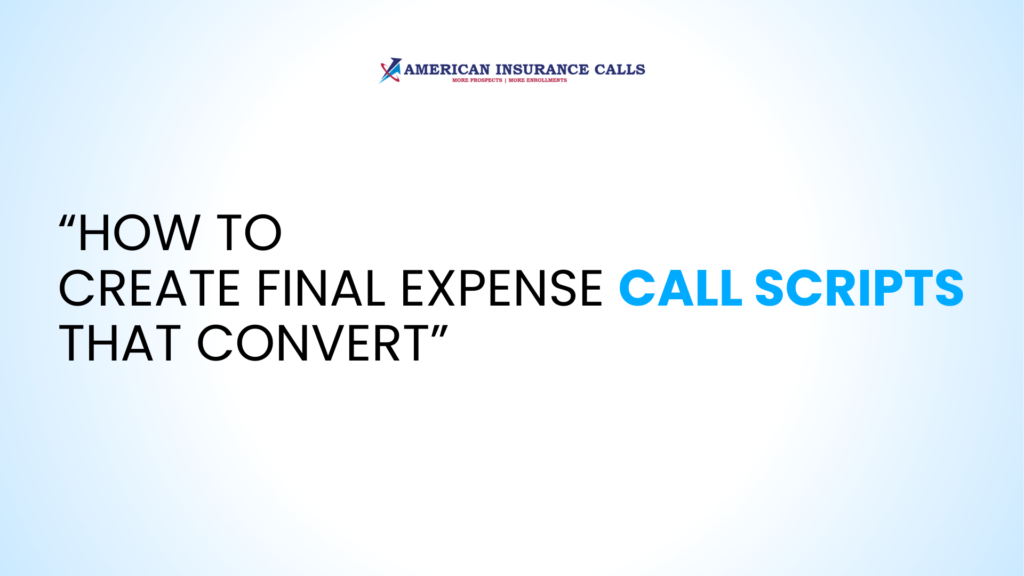Final expense insurance, also known as burial insurance, is a crucial product for many seniors looking to ease the financial burden on their loved ones. For insurance agents, effectively communicating the benefits of these plans during calls is key to converting prospects into clients. A well-crafted call script can help you build trust, address concerns, and close sales efficiently.
This article will guide you through creating final expense call scripts that convert, ensuring you connect with prospects and deliver value in every conversation.
Why Call Scripts Are Important
A thoughtfully designed call script ensures you:
- Stay Consistent: Deliver a professional and reliable pitch every time.
- Address Key Concerns: Anticipate and resolve common objections.
- Build Trust: Show empathy and establish credibility with prospects.
- Maximize Conversions: Guide the conversation toward a successful close.
Call scripts act as a roadmap, helping you navigate each interaction smoothly while leaving room for personalization.
Key Components of a High-Converting Final Expense Call Script
1. Engaging Introduction
The first few seconds of your call are critical. Use a warm and professional introduction to grab the prospect’s attention. Example:
- “Hello [Prospect’s Name], this is [Your Name] from [Your Company]. How are you doing today?”
Follow with a brief statement about the purpose of your call:
- “I’m reaching out because we specialize in helping seniors like you secure affordable final expense insurance to ease the financial burden on your loved ones. Do you have a moment to discuss this?”
2. Build Rapport
Before diving into the details, establish a connection with the prospect. Ask open-ended questions to understand their situation:
- “Have you thought about how your loved ones would handle final expenses?”
- “What’s most important to you when considering coverage for these costs?”
Building rapport shows empathy and demonstrates that you’re genuinely interested in their needs.
3. Present the Value Proposition
Clearly explain the benefits of final expense insurance and how it addresses their concerns. Use simple, relatable language. Example:
- “Final expense insurance is designed to cover the costs of funeral arrangements, medical bills, and other end-of-life expenses. Plans are affordable, don’t require a medical exam, and provide peace of mind knowing your loved ones won’t face financial stress.”
Focus on key selling points:
- Fixed premiums that won’t increase.
- Coverage amounts tailored to their budget.
- Quick and easy approval process.
4. Qualify the Prospect
Ask qualifying questions to determine if the prospect is a good fit for final expense insurance. Examples:
- “Are you currently covered by any life insurance plans?”
- “What type of budget are you comfortable with for monthly premiums?”
- “Do you have a specific amount in mind for coverage?”
These questions help you tailor your pitch to their needs and improve the likelihood of conversion.
5. Overcome Objections
Be prepared to address common objections. Examples and responses include:
- Objection: “I can’t afford another bill.” Response: “I understand, and that’s why final expense plans are designed to be affordable. We can find a plan that fits your budget, starting as low as $20 per month.”
- Objection: “I already have life insurance.” Response: “That’s great! Many people add final expense coverage to ensure that specific costs, like funerals, are fully covered without affecting their life insurance payout.”
- Objection: “I need to think about it.” Response: “I understand this is an important decision. Would it help if I sent you a summary of the plan options we discussed today?”
6. Create Urgency
Encourage prospects to act quickly by emphasizing the benefits of enrolling now. Example:
- “Rates are based on your age and health, so locking in coverage today ensures you get the best rate. Plus, the application process is quick and easy.”
Avoid high-pressure tactics, but gently remind them of the importance of securing coverage for their peace of mind.
7. Guide to Next Steps
End the call with clear instructions on what happens next. Example:
- “If you’re ready, we can start the application process over the phone. It only takes a few minutes.”
- “I’ll email you a summary of the plan options, and we can schedule a follow-up call to finalize everything.”
Ensure the prospect knows what to expect and how to proceed.
Sample Final Expense Call Script
Introduction:
“Hello [Prospect’s Name], this is [Your Name] from [Your Company]. How are you today?
I’m reaching out because we specialize in helping seniors secure affordable final expense insurance to protect their loved ones from unexpected costs. Do you have a moment to discuss this?”
Build Rapport:
“I’d love to hear more about your situation. Have you thought about how your loved ones would handle funeral costs and other final expenses?”
Value Proposition:
“Final expense insurance is designed to cover costs like funerals, medical bills, and unpaid debts. It’s affordable, easy to qualify for, and ensures your family won’t face financial stress during a difficult time.”
Qualify the Prospect:
“To help find the best plan for you, can I ask a few questions?
- Do you currently have any life insurance coverage?
- What’s a comfortable budget for you when it comes to monthly premiums?
- Are there specific costs you’d like this plan to cover?”
Overcome Objections:
- “I need to think about it.”
“I understand completely. Making this decision is important. Would you like me to send you more information so you can review it at your convenience?”
Create Urgency:
“Since rates are based on age and health, securing a plan today ensures you lock in the most affordable rate. It only takes a few minutes to apply.”
Next Steps:
“I’d be happy to walk you through the application process now. It’s quick and easy, and we can secure your coverage today. Does that sound good to you?”
Tips for a High-Converting Final Expense Call Script
- Personalize the Script: Adjust your approach based on the prospect’s responses and needs.
- Practice Active Listening: Show empathy and address concerns directly.
- Keep It Simple: Use clear, jargon-free language.
- Focus on Benefits: Emphasize how the plan provides peace of mind and financial security.
- Track Performance: Monitor the success of your script and refine it based on feedback and results.
Conclusion
A well-structured final expense call script is a powerful tool for converting prospects into clients. By focusing on empathy, clarity, and value, you can build trust and guide prospects toward making informed decisions. Use the strategies and sample script provided here to create personalized, high-converting calls that drive results.

